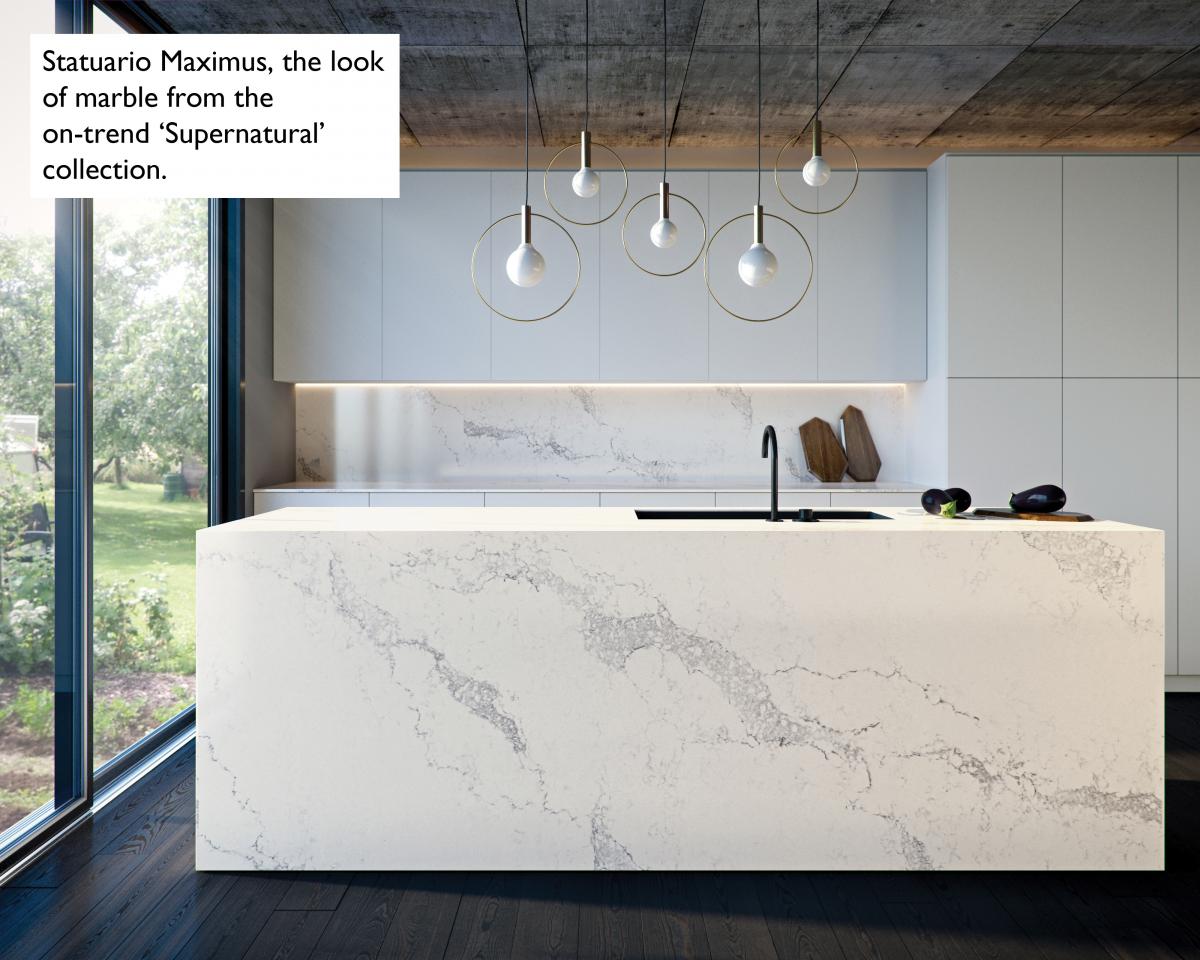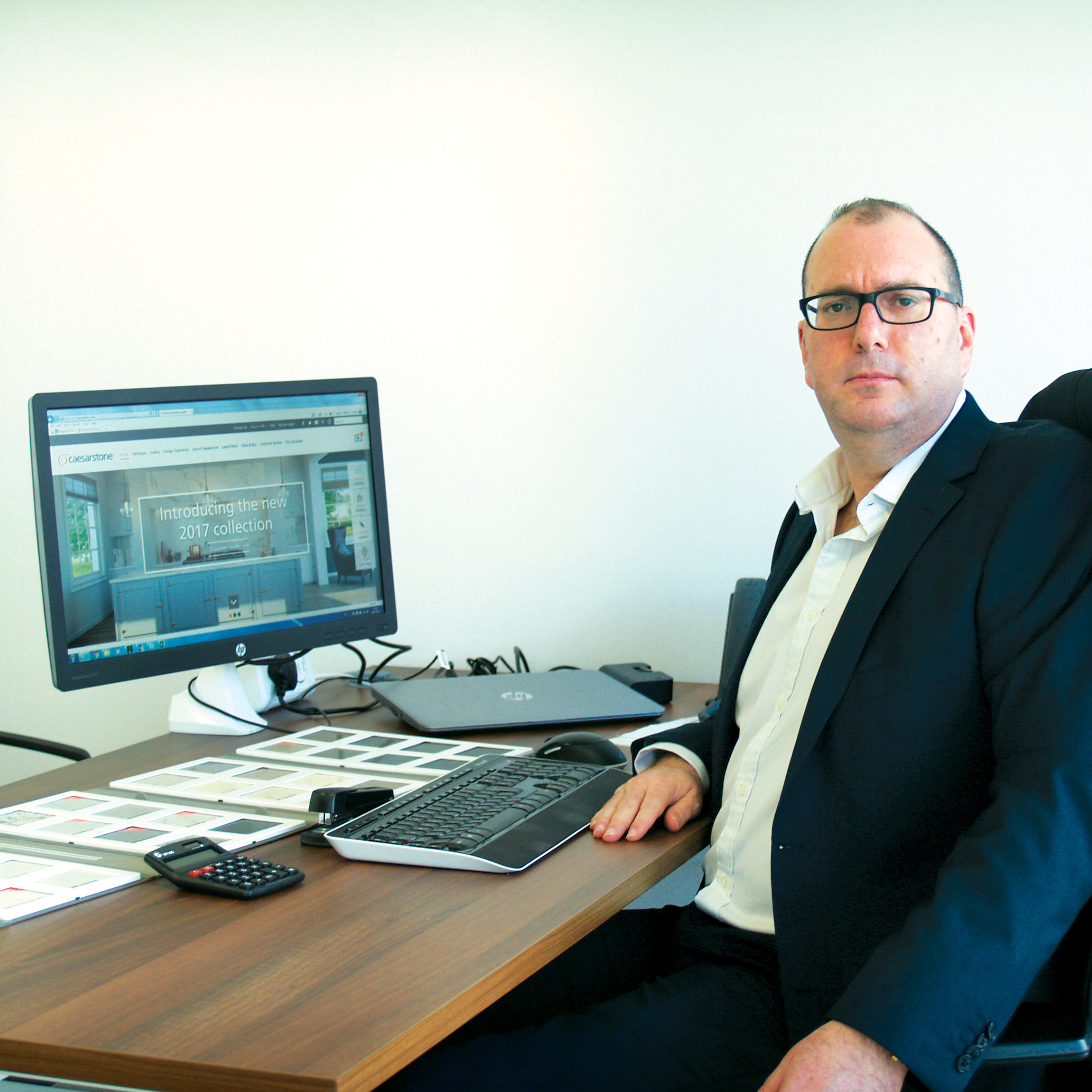Caesarstone aims for market leadership with its own UK operation
Caesarstone is usually credited with second position in the UK quartz surfaces market. But it wants to be first, which is why it has opened its own operation in the UK. Amir Reske, MD of the UK subsidiary, talks to NSS about the move.
- Ad for an $820,000 one-bedroom condo in New York: The open kitchen has top-of-the-line stainless steel appliances, Caesarstone countertops and an extensive breakfast bar.
- Ad for a $5.25million house in New York: An additional bedroom and a contemporary styled bathroom with Caesarstone topped sink and vanity, glass tiles and glass tub / shower enclosure complete this floor.
In America, the name of Caesarstone is synonymous with quartz worktops. It has become a generic term for them, like ‘Google’ for internet searching. And a Caesarstone worktop is such a selling point it is mentioned in estate agents’ advertisements for high value property.
Caesarstone has one of its three factories in America and a subsidiary handling distribution and marketing there. It is the company’s biggest market, with sales last year worth US$222.5million. It has another subsidiary handling its operations in Australia, which has a population of just 24.2million people. Sales there last year were worth US$130.9million. Its subsidiary in Canada (population 36.5million) had sales last year of US$85.7million.
 In contrast, the whole of Europe (including the UK), with a population of 739million people, bought just US$25.6million worth of Caesarstone products last year.
In contrast, the whole of Europe (including the UK), with a population of 739million people, bought just US$25.6million worth of Caesarstone products last year.
Hence Caesarstone’s decision to establish its own warehouse and offices operated by its own UK subsidiary. It is in modern, 4,000m2 premises just off the M25 at Enfield, EN3. It plans to stock 12,000-13,000 slabs of 40 or so of the 70 colours in the Caesarstone range. There will be standard and jumbo size slabs, 20mm and 30mm thick in the range of finishes.
There are 23 people employed by Caesarstone UK so far with a target of about 30, half of them stationed in Enfield and the rest visiting customers and clients. The company has three of its own Hiab-equipped artics for making deliveries that it will supplement with contracted transport if and when necessary.
Amir Reske, appointed Managing Director of Caesarstone UK, says Britain (and the rest of Europe, although that does not concern him) has low quartz penetration compared with Caesarstone’s main markets. That presents an opportunity. “Our role here is to explain to the industry and to the public why quartz and why Caesarstone.”
The UK operation has been established to follow a model that is proving successful elsewhere in the world.
Not that using an exclusive distributor in the UK, which Caesarstone had previously done, can be said to have been unsuccessful. CR Laurence, which sold Caesarstone in the UK and Ireland until now, is normally considered to have given the brand number two position in the UK engineered quartz market.
But Amir says: “Caesarstone doesn’t like to be number two.” In the territories where the company has its own subsidiaries handling the business it is market leader. That is its ambition in the UK.
The change unsettled the market and fabricators using Caesarstone have been concerned about the continuity of supply, which has perhaps led to a certain level of stocking up. But whatever the reason, Amir says he has been amazed at the number of orders coming in since Caesarstone UK started trading at the beginning of the year.
Amir’s background is not in, nor even related to, the quartz market. He was previously CEO of an air conditioning company in Israel. Caesarstone has two of its factories in Israel and originated there, although these days it describes itself as an international company. It is listed on the American Nasdaq stock exchange and sells its quartz in 50 countries.
Amir has worked in the UK previously and has dual Israeli and UK citizenship. He was Business Development and Chief Investment Officer with the late Sir Bernard Schreier’s CP Holdings, with interests ranging from banking to property. Initially he was a lawyer, which he practised for 10 years – “nobody’s perfect,” he says with a smile.
He was looking for a new challenge and new opportunities and had put out feelers when he was approached about the Caesarstone UK position.
The decision had already been made by Caesarstone to establish its own operation in the UK and it was looking for someone to head that operation. Amir was offered positions by other companies in Africa and the USA. What made him choose Caesarstone? “I love England; don’t ask me why.”
Caesarstone had made the decision to move into the UK before the UK’s referendum on European membership was held, with its unexpected Brexit result. Whether the UK was supposed to be a stepping stone into European expansion and whether that position will have been altered by the vote, Amir does not know. He knows only that Caesarstone continually monitors its markets and its plans for the UK are part of its growth strategy based on the low level of penetration of quartz in the UK compared with other developed world countries.
The UK also needs to build 150,000-250,000 new homes a year. That is an appreciable number of kitchens and bathrooms on top of the ongoing refurbishment of a proportion each year of the existing housing stock of around 25million homes.
Quite what level of penetration quartz has in the UK is a matter of conjecture and anecdote as there are no official figures to provide any light. Caesarstone believes quartz accounts for more than half the natural and engineered stone worktop sector and certainly a lot of worktop fabricators say more than half their income comes from quartz. But Amir believes there is still a long way to go with quartz in the UK. “I think it’s far from having reached its peak.”
The market is split these days between top end, branded products and the low end commodity market where fabricators compete to be the cheapest supplier of imports and own brands, often sourced in the Far East. Caesarstone is firmly in the first category and does not believe the second category will impact adversely on it.
Amir likens it to him and Gordon Ramsey baking cakes. They would both be cakes but Gordon Ramsey’s would be better and command a higher price.
“Caesarstone produces this quartz stone, some of it with semi-precious stones. We are not cheap but people are willing to pay for something that’s unique. At the top end there’s growing interest.”
That interest is currently being stimulated by Caesarstone’s ‘Supernatural’ collection in particular. This is veined quartz with names like London Grey, Georgian Bluffs and Statuario Nuvo. The company describes it as ‘a range that mirrors the complexity, emotion and uniqueness of natural stone while delivering superior quality and durability’.
Amir: “We keep reinventing quartz. Who would have thought it could look like marble? We’re selling lifestyle and design.”
On the other hand, the product itself is only half the story. The narrative is completed by the workmanship that converts the slab into a finished surface. Minor imperfections can be major irritations to customers who see them every day in their kitchens or bathrooms. That is why Caesarstone intends to establish a network of approved fabricators that it can work with to promote the brand.
Such a network had been established by CR Laurence, but it has now launched its own range of quartz and porcelain in competition with its previous partner and is holding on to the details of its distribution network. Caesarstone is not quite starting from scratch because it is happy to welcome on board any established Caesarstone fabricators, but would be delighted to hear from others, and kitchen & bathroom showrooms, anywhere in the country that would like to become part of its network.
Jon Stanley, the newly appointed Marketing Director of Caesarstone, says the critical aspect now as far as he is concerned is that there is no third party between Caesarstone and its customers.
Amir elucidates: “We can utilise everything Caesarstone has – like the Caesarstone ‘university’. We have people in Israel now being trained – UK employees; technical people. Caesarstone University will come over to the UK to conduct seminars for fabricators, for showrooms, for architects… whatever’s needed. We will speak to them through different channels in language that appeals to them and which they understand.”
Even seasoned fabricators familiar with Caesarstone can learn new ways of using the material. Thermoforming, for example, can be used to bend vertical quartz surfaces to follow curved horizontal surfaces.
Amir: “We don’t sell to the general public, but since we opened our headquarters in the UK people have come in here and asked questions. They have come here because they recognise the brand. They thought they could buy a fitted worktop here, which they can’t, but we have given them time because word of mouth is the best advertising there is.
“We had someone call us and say: look, I bought a Caesarstone worktop five years ago and now its stained, can you fix it? We went and looked because we are going to be here next year… in 10 years’ time. We have poured a lot of money into getting this place up and running. The whole idea is to be here for the long term.”
Jon Stanley emphasises that establishing a reputation takes time. The product itself has to meet and exceed expectations, but it also has to be seen in the right places, which these days means in the virtual world as well as the real world, pushing sales through the distribution chain at the same time as creating the pull of demand from customers.
Caesarstone’s aim is to be the must-have worksurface, reflecting and leading trends in the market place. Amir: “Caesarstone’s R&D is the best in the world. It spends a lot of time and money on it. It teams up with world famous designers to see where the market is going; what the trends are. There are a lot of exciting products yet to come.”

